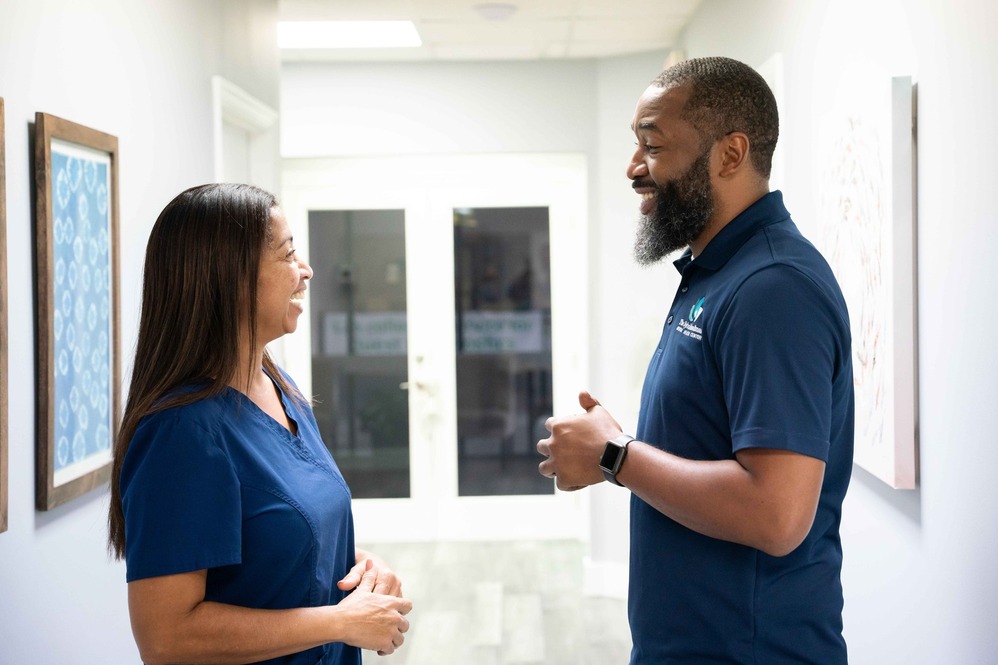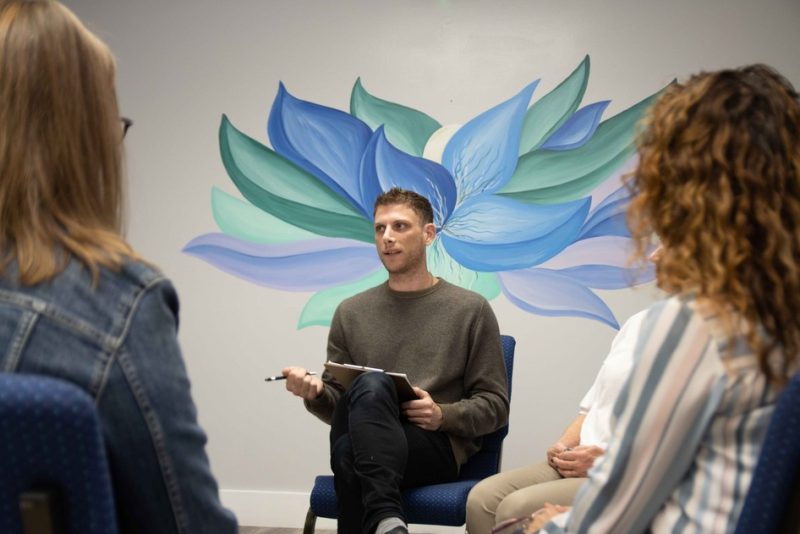The Sylvia Brafman Mental Health Center is a leading provider of mental health treatment in the Southeastern United States. We offer specialized care for a variety of mental health diagnoses, including (but not limited to) mood and anxiety disorders, personality disorders, and co-occurring substance use disorders.

Mental Health Intensive Outpatient Programs (IOPs) Near Atlanta, Georgia
What Is an Intensive Outpatient Program (IOP)?
There are numerous programs designed to provide a safe and structured environment to address mental health concerns. Intensive Outpatient Programs (IOPs) are one of many program options available to you. IOPs are non-residential programs that allow you to seek support while also having the flexibility to maintain important aspects of your daily life.
Intensive outpatient programs for mental health typically meet three to five times per week for a few hours at a time. They combine individual therapy, group therapy, and psychoeducation, depending on the diagnosis. Family therapy is even offered in some programs. Emphasis is put on emotional regulation, symptom management, skill-building, and developing coping strategies.
Intensive outpatient programs are an excellent fit if you want to seek mental health services while still attending to personal and professional obligations in your life. No matter what diagnosis you are grappling with, we are here to help. If you are curious about outpatient mental health services, reach out to us.

Do IOPs Offer Mental Health Treatment and Therapy Options?
Yes, IOPs offer mental health treatment and therapy. Though there are certainly focused addiction recovery IOPs, outpatient rehab is not only for addressing Substance Use Disorder (SUD). Outpatient mental health care aims to understand and alleviate symptoms for a range of mental health conditions to help you find emotional balance and improve your mental well-being.
An intensive outpatient program for anxiety, trauma, depression, or related mental health concerns offers an array of services and therapy approaches. These include Cognitive-Behavioral Therapy (CBT), trauma-informed care, and dual diagnosis treatment. For more information regarding our mental health services at The Sylvia Brafman Mental Health Center, contact us today.
What is Treated at a Mental Health IOP Near Atlanta, Georgia?
Mental health IOP programs in Atlanta, Georgia, and beyond are equipped to treat a number of mental health conditions in an effort to support your mental wellness. Many forms of treatment are accessible to you at an IOP treatment facility to assist in addressing a range of diagnoses.
For more information, here are some examples of conditions frequently treated at a mental health intensive outpatient program in Atlanta, Georgia, and the surrounding regions.

At The Sylvia Brafman Mental Health Treatment Center in Fort Lauderdale, Florida, our team of dedicated professionals is ready to guide you. We offer IOP programs and a variety of treatment programs, each uniquely designed to meet your needs. We’re also able to offer accommodation at affordable rates if you’re traveling from out of state. So don’t wait—reach out to us today! Either give us a call or fill out the form below to request a callback.
"*" indicates required fields

Do Intensive Outpatient Programs Offer Dual Diagnosis Treatment and Therapy in Georgia?
Yes, IOPs offer dual diagnosis treatment options. A dual diagnosis is when you have two comorbid disorders. For example, mental health and substance use disorders are often co-occurring and can be treated concurrently. There are many effective integrated treatments and therapies that will help you address and heal two conditions at the same time.
At The Sylvia Brafman Mental Health Center, we pride ourselves on delivering effective dual diagnosis treatment programs. Our experienced clinicians recognize the intricate nature of co-occurring disorders and focus on addressing the underlying causes of mental health and substance use challenges. Reach out to our compassionate patient advocates today if you think you or a loved one is struggling with comorbid conditions.
What is Treated at a Dual Diagnosis IOP in Greater Atlanta, GA?
Intensive outpatient programs in Atlanta, Georgia, offer dual diagnosis treatment for a range of co-occurring disorders, including the examples highlighted below. Dual diagnosis is when two concurrent disorders are treated at the same time, as mental health and substance use are frequently interconnected.
Specifically, psychiatric comorbidity is when an individual has one or more mental health disorders and one or more Substance Use Disorders (SUDs). IOPs for co-occurring disorders require specialized care to address both issues simultaneously. Integrated therapy, or focusing on the relationship between the two disorders, is the primary method of treating comorbid conditions. Here are some of the dual diagnoses that can be treated in an IOP:

Does Private Health Insurance Cover IOPs in Georgia?
Most private health insurance companies offer some level of coverage for intensive outpatient programs in Georgia. The specifics of coverage vary depending on a number of factors, including your diagnosis, medical necessity, the treatment plan, and your plan and policy terms.
Many insurance providers, including BlueCross BlueShield, Aetna, Cigna, and the New York State Health Insurance Program (NYSHIP), provide mental health benefits within their plans. To find out more information, you can contact your insurance provider or reach out to one of our patient advocates to verify your insurance.
How to Find a Mental Health IOP Near Me
There are many options for mental health treatment, and choosing one can be overwhelming. The Sylvia Brafman Mental Health Center is dedicated to providing a supportive environment to heal. We are located at 7710 NW 71ST CT, Tamarac, Florida, 33321, just west of Fort Lauderdale. We are happy to discuss treatment options with you. Contact us to learn more today.
The Atlanta area has a vast network of mental health resources, many of which may be helpful in finding the right IOP for you. See our guide for tips on how to find a reputable and effective Intensive Outpatient Program (IOP) near you.
- The Sylvia Brafman Mental Health Center, 7710 NW 71ST CT, Tamarac, Florida, 33321

What is the Admissions Process for a Mental Health Intensive Outpatient Program in Georgia?
Each intensive outpatient program has different protocols when it comes to the way programs are organized. The best way to understand the full admissions process is to reach out to the facility directly. However, you can probably expect the admissions process for an IOP to have steps similar to this:
- Initial Assessment: The first step of treatment is to conduct an assessment to determine the proper care. You will be asked questions to determine a diagnosis and the scope of treatment that will be necessary.
- Insurance Verification: Handling insurance can be overwhelming. At this stage, the care team will work with you to iron out any insurance details.
- Intake Appointment: This stage is where your care team gathers information about you, such as your background, areas of concern, important relationships, and any goals for treatment that you wish to share.
- Treatment Planning: Based on your diagnosis and other assessment information, a tailored treatment plan will be created. This plan is typically subject to change, depending on how treatment progresses.
- Program Orientation: During this step, you will orient yourself to the diagnosis, treatment plan, the facilities, and the staff you will be working with.
- Treatment: The treatment part of the program is where all the work happens. This is the stage where you will work with your care team to address your diagnoses and work to improve your overall quality of life.
What Happens During a Mental Health IOP?
Intensive outpatient programs for mental health provide a supportive, structured environment to focus on further developing tools and skills from prior treatment. You can expect to spend a minimum of ten hours each week working with mental health professionals. Your time in IOP treatment will provide invaluable experience that you can apply to your life and make lasting changes.
These intensive programs feature several forms of therapy, as well as psychiatric and medical care. IOPs approach wellness from all angles, ranging from mental to physical health. With the support and tools gained in the program, you will be able to move forward with new tools to manage your condition and enhance your overall life.
The specifics of treatment offerings can vary from facility to facility, but in general, you can expect any number of the below. Please note this is not a comprehensive list.
- Individual therapy
- Group therapy
- Medication management
- Psychiatric evaluations/assessments
- Treatment planning
- Physical fitness
- Skill-building
- Psychoeducation
- Family dynamics
If you are considering starting treatment through an intensive outpatient program in Atlanta, Georgia, a good first step is to start with our free assessment.




